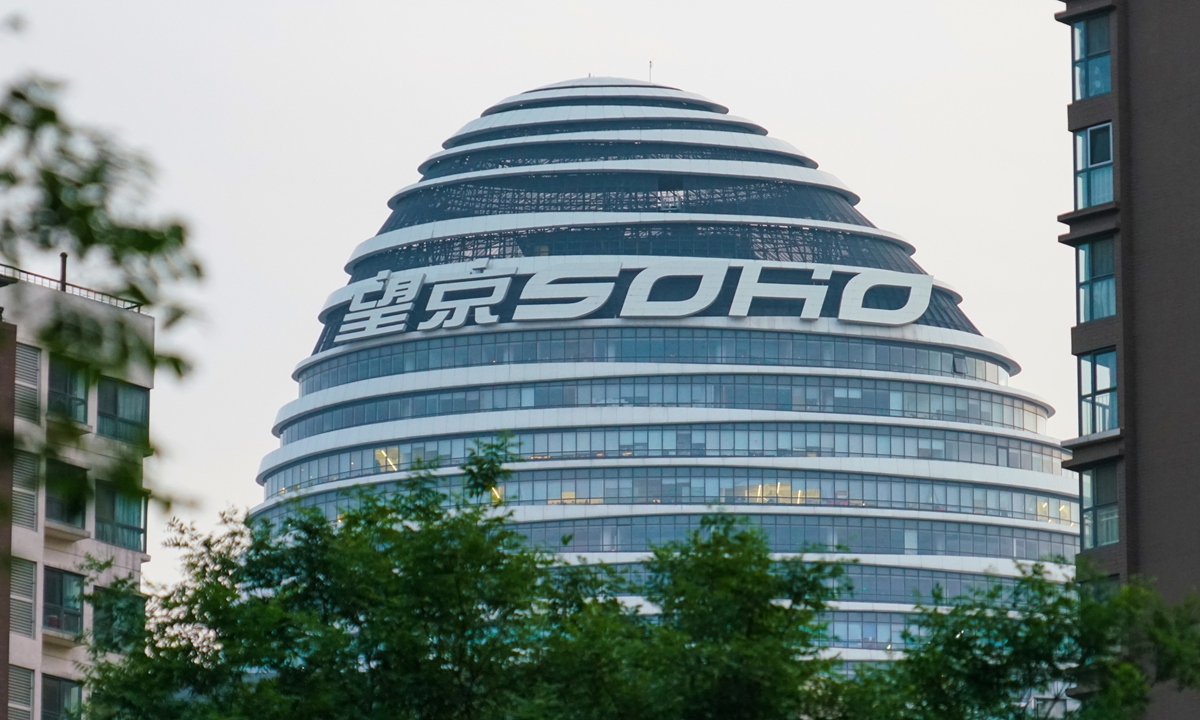China’s fashion imports from South Korea fall amid COVID-19 cases
Traders face additional work, costs after cases linked to imported goods

View of the Wangjing area with the Wangjing SOHO.File Photo:VCG
Chinese importers and vendors are suspending orders or ramping up disinfection work for fashion products directly imported from South Korea after several COVID-19 cases in Beijing, Northeast China's Liaoning Province and East China's Jiangsu Province were suspected of being connected to imported fashion goods from the country.While the proportion of imported fashion products from South Korea only makes up a tiny percentage of bilateral trade, and the actual disruption posed by the reported cases still takes time to evaluate, industry insiders fear that what happens to imported fashion products could cast shadows over a wider range of imported goods from South Korea, a major trading partner of China.
An online vendor on Tmall.com selling South Korean clothing told the Global Times on Tuesday that there are fewer people buying the products these days, which has something to do with the reported cases that are related to imports from South Korea.
"In order to further reduce the potential risks, we are doing sterilization upon the products' arrival, and we do it again before dispatching goods to customers," the vendor said.
The potential risks of imported goods from South Korea have had a wider impact, not only on fashion and clothing but other products as well, the Global Times learned.
A manager surnamed Zhang at a Shenzhen-based trading agency told the Global Times on Tuesday that all the products from South Korea are currently supposed to be put in warehouses at ports for at least 10 days after clearance before being delivered for sterilization work and reducing risks.
"Buyers will need to pay for all the extra costs generated throughout this time, including the stocking fees," Zhang said.
As the result of the additional sterilization procedure, the costs and risks, Zhang said that orders for South Korean goods have been reduced by at least 50 percent these days.
From 4 pm on Sunday to 4 pm on Monday, Beijing reported 10 new local COVID-19 infection cases. Among them, eight were clerks and co-tenants of a clothing store specializing in South Korean fashion based in the Wangjing SOHO complex, Beijing's Chaoyang district, the city's health authorities stated.
On Saturday, local health authorities in Dalian, Liaoning Province said in a notice that the gene sequence of a new positive infection in Dalian on April 1 was an Omicron variant, and the patient was the employee of a fashion store selling imported clothing from South Korea.
The new coronavirus nucleic acid single gene was detected on the inner surface of the imported clothing and packaging bags handled by the employee, according to local health authorities.
The notice pointed out that the possibility of infection due to contact with imported goods that are contaminated with the virus cannot be ruled out.
A similar case was reported on March 28 in Changshu, Jiangsu. After repeated testing, four South Korean sweaters purchased online in the wardrobe of the confirmed case's residence were found to be positive.
Because of epidemic prevention needs, the customs clearance process that used to take about a week is now extended to around two weeks, a trader of South Korean goods surnamed Li told the Global Times on Tuesday.
Due to the epidemic situation, the large-scale procurement service offered by individuals from South Korea to China is impossible. Li said that sterilization work will likely be further intensified, and some international traders have stopped taking orders for fashion products from South Korea in a bid to fend off the risks.
China imported $1.502 billion of textiles and clothing from South Korea in 2019, accounting for 5.9 percent of the industry's total annual imports, a tiny proportion compared with other traded goods.
The top five items exported from South Korea to China are machinery, chemical products, plastics and rubber, base metals, and mineral products, according to the Korea Customs and Trade Development Institution.
A Beijing-based customer surnamed Liu told the Global Times on Tuesday that she noticed the rising reported cases that have been linked to South Korean goods, and she has temporarily stopped buying any goods from the country to avoid risks.
Liu used to buy South Korean fashion and clothing as well as food and cosmetics. She said that she will still buy these products as soon as the situation has eased.
Industry insiders said that the sporadic cases have a limited impact on overall trade between the two countries and the impact will be temporary, given the increasingly large potential in bilateral trade.
Currently, China is South Korea's largest trading partner, largest export market and largest source of imports, while South Korea is China's fifth-largest trading partner.
With the Regional Comprehensive Economic Partnership coming into force this year, China will gradually reduce tariffs on a wide range of products, including textiles and stainless steel produced in South Korea to zero.



